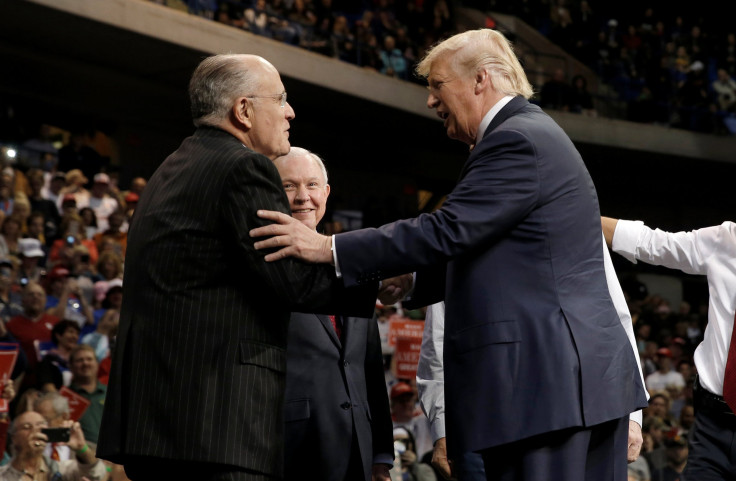Rudy Giuliani Is Terrifying To Blacks, Muslims: 5 Things To Know About Trump’s Potential Attorney General

For a president-elect who went against all the established norms of campaigning, Donald Trump’s cabinet choices promise to be equally unpredictable. Rather than a familiar list of Washington insiders, Trump is expected to surround himself with the few Republicans who stood by him as the party establishment kept their distance during the campaign.
Near the top of that list is steadfast supporter Rudy Giuliani. The former Republican presidential candidate is perhaps best known on the national stage for his stoic attitude as New York City mayor in the wake of the Sept. 11, 2001, terrorist attacks on the World Trade Center. But a deeper look into his record as mayor and prosecutor along with his public comments provide plenty for people of color to be wary about should he be given the post of the United States’ top prosecutor.
Stop-and-Frisk
Giuliani’s proudest achievement is dramatically lowering the crime rate in New York City during his eight years as the city’s mayor. However, there has been plenty of skepticism about not only whether he was the man responsible for the improvement but the methods he claims helped achieve it. At the top of that list is stop-and-frisk, a policy that disproportionately targeted young black and Latino men to the tune of 90 percent of all stops. It has also been found to be ineffective and in 2013 a federal judge ruled it unconstitutional. Despite that, Trump has suggested that stop-and-frisk will be a major part of his law-and-order agenda.
Police Violence
In a wake of a host of well-publicized police shootings of unarmed black people, Giuliani has been anything but sympathetic to the cause of the Black Lives Matter movement.
"It's inherently racist because, number one, it divides us. ... All lives matter: White lives, black lives, all lives," he told Fox News in July.
That sort of position is nothing new for the 72-year-old. During his time as mayor of New York City, there were several high-profile instances of police brutality, including the killing of unarmed African immigrant Amadou Diallo after being fired on 41 times and the brutal sexual assault of Abner Louima, who was forcibly sodomized by New York City Police Department officers. Throughout the Diallo and Louima protests, Giuliani continued to support the police force and insisted that only they could investigate fellow officers.
@ninaturner Trump just won Ohio. Thanks for not helping. Hope you're happy now. If Giuliani becomes AG many black ppl will suffer.
— Polly Olly Doodles All the Day (@pollyollydoodle) November 9, 2016
And your reluctance will lead to AG Rudy Giuliani enacting nationwide stop-and-frisk. Bite me! https://t.co/G4kgKSbTHq
— Solomon Alexander (@RealBigSol) November 10, 2016
Broken Windows
Giuliani is the most prominent disciple of the broken-windows theory, a zero-tolerance approach to crime where minor crimes are heavily targeted in order to prevent more serious crimes. The policy came back into the spotlight after the 2014 death of Eric Garner, who was suspected of selling illegal cigarettes when he was approached by police in Staten Island and placed in a chokehold that led to his death. Giuliani later defended the police.
“The police can’t help it, no matter what law they’re enforcing,” he said. “The police can’t help it if you’re acting wild, if you start acting nasty, if you resist arrest. Then they have to react.”
Y'all do understand that w/ Giuliani as AG & David Clarke heading DHS, any protest, especially w/ POC, will be met with lethal force.
— KanuriYah (@KaNuri) November 10, 2016
Immigration
During his time as mayor of New York City, Giuliani defended the rights of undocumented immigrants. But he has since made a seismic shift toward trumpeting the anti-illegal immigration policies of Trump. Giuliani has backed Trump’s plans to build a wall along the entirety of the U.S.-Mexico border and told CNN Thursday the president-elect could use an executive order to get it done. While Giuliani has tried to backtrack on Trump’s call for mass deportations of undocumented immigrants, he has exclaimed that Trump will “secure our borders” and made it clear he doesn’t believe the U.S. should be taking Syrian refugees.
Targeting Muslims
Although in the aftermath of Sept. 11, 2001 attacks he urged unity amid reports of violence against Muslims, the Muslim community has reason to fear Giuliani as a potential attorney general. He has been suggested by Trump as the man to run a commission on “radical Islam.” And in an interview with NJ Advance Media in July, he said he would be in favor of forcing Muslims on the government’s terrorism watch list to wear electronic monitoring tags. Such policies are nothing new for Giuliani. He was roundly attacked by civil liberties groups for a secret program spying on every mosque within a 100-mile radius of New York City during his eight years as mayor.
© Copyright IBTimes 2024. All rights reserved.




















